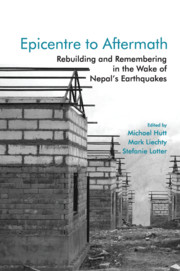6 - Humanitarian Responses of I/NGOs after the 2015 Earthquakes: Empirical Evidence from Gorkha, Sindhupalchok, and Southern Lalitpur
Published online by Cambridge University Press: 08 July 2021
Summary
Introduction
The aftermath of World War II saw a proliferation of non-governmental organizations (NGOs) and international non-governmental organizations (INGOs) worldwide. Like other countries in the Global South, Nepal too saw a rise in the number of I/NGOs after 1990, under institution-building and civil-society-strengthening projects designed to foster participatory democracy, good governance, and development (Frewer 2013; Suleiman 2013, cited in Jones et al. 2014). While some argue that the Nepali term nagarik samaj is equivalent to the English term ‘civil society’ and that the term came into use mainly after 1990 (Shah 2008), M. S. Tamang (2017) notes that the concept of civil society emerged in the context of the struggle against the Panchayat system to protect the rights of people as equal citizens, which culminated in the political change of 1990. This ‘civil society’ comprised a wide array of traditional self-help groups, human rights and professional organizations, ethnic and caste-based advocacy groups, and collectives of independent individuals aiming to achieve specific goals. In many instances these functioned very similarly to I/NGOs (M. S. Tamang 2017). Furthermore, Heaton-Shrestha and Adhikari (2011) stress that these organizations’ everyday works were often evaluated as performances which led to them being perceived as ‘political’ by state authorities during the struggle against King Gyanendra's direct rule after 2005.
Increasingly, I/NGOs may be seen to be serving as alternatives for government (Lassa 2018), which is typically characterized as ‘bureaucratic’ and ‘elite-centred’ (D. Lewis 2014 in Carrasco and O’Brien 2018). In Nepal, NGOs tend to be associated with groups in civil society which lack a broad membership. Some have criticized them for being undemocratic and lacking accountability and transparency (J. Ghimire 2008: 91; Shah 2008; S. Tamang 2005, cited in Baniya 2014); it is alleged that they work under the direction of foreign agents and lack autonomy (Dahal, 2001:113). Panday argues that, because major policies are formulated by foreigners in the headquarters of bilateral and multilateral aid organizations, Nepal's bureaucracy does not have any influence in the process. This not only undermines state institutions, but also distracts the state's attention away from public programmes and services (Panday 1999, 2011, cited in Baniya 2014)
- Type
- Chapter
- Information
- Epicentre to AftermathRebuilding and Remembering in the Wake of Nepal's Earthquakes, pp. 135 - 150Publisher: Cambridge University PressPrint publication year: 2021
- 1
- Cited by

